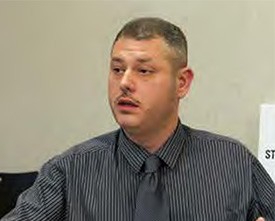
-
Practice Area:Community Organizing
-
Practice Method Concentration:Children and Youth in Families and Society
Placed in foster care as an adolescent, Corey O’Neill encountered many of the problems plaguing the system: poverty, neglect and abuse.
But his experience — which included incarceration at the age of 17 — motivated him to change the course of his trajectory. He earned his high school diploma while in prison and, after being released, found a job and pursued a college education.
O’Neill was accepted into the University of Michigan, where he earned his undergraduate degree in psychology. He credits U-M alumni Paul and Amy Blavin, founders of the Blavin Scholarship, for making the commitment to his success in college. The scholarship provides financial assistance and a community of support to undergraduate students who have been part of the foster care system.
“I came from a background where going to college was not an option,” says O’Neill. “Not even an idea. As a former foster care youth, I had a lot of misconceptions about what college was like. Mr. Blavin is a very hands-on donor, and he was personally invested in seeing me succeed. Once I got involved in the program, I found my calling.”
Through the Blavin Scholars program, O’Neill discovered his talent for public speaking, and found a platform from which to tell others about his experience in the foster care system. The School of Social Work took notice of his passionate advocacy for current and former foster care youths and encouraged him to pursue his MSW. For O’Neill, it was the opportunity to fulfill his dream of changing lives.
We’re talking about saving children’s lives. What could be more rewarding than that?
“Foster care youth is a population of young people who can’t speak for themselves, and without social workers, they’d have no one to do it for them,” said O’Neill. “I know firsthand what they face. I was in foster care 20 years ago and a lot has changed for the good, but I want to do more to bring about significant change in these young people’s lives.”
O’Neill became the first Blavin Fellowship recipient among School of Social Work graduate students. He also was awarded a Child Welfare Scholarship, one of only 10 given each year.
“I’m so fortunate to be learning from the pioneers in this field through the Child Welfare Scholars program,” says O’Neill.
“Abused children are a very sensitive population and it takes very special people to teach and work in this field. Robert Ortega, a child welfare professor, has a true gift for presenting child maltreatment in a delicate manner while also teaching us how to handle it effectively. The focus of this scholarship is on abuse and neglect, and that adds a human element that you’re not likely to find in other degrees or programs.”
Committed to improving the lives and educational outcomes of youth who come through the foster care system, O’Neill cites statistics that keep him focused on his goal: only 10 percent of foster care youth who finish high school go on to pursue a secondary education; 2 percent actually complete their studies and earn a degree; and roughly 60 percent of foster care male youth will be incarcerated.
“This is an underrepresented population that is in dire need of help.”
O’Neill is already doing that in his field placement through the Child Welfare Scholarship program at SUDDS (Stop Underage Drinking/Drugs Downriver) Coalition Guidance Center. O’Neill advocates for youth at the community level, organizing and facilitating town hall meetings that educate youth, parents and others in the community about the effects and consequences of underage drinking and substance abuse. He says he wants to continue working with youth and use his experience at SUDDS as a launching pad for something bigger in his career.
“We’re talking about saving children’s lives,” he says. “What could be more rewarding than that?”
Written by Anne Farris